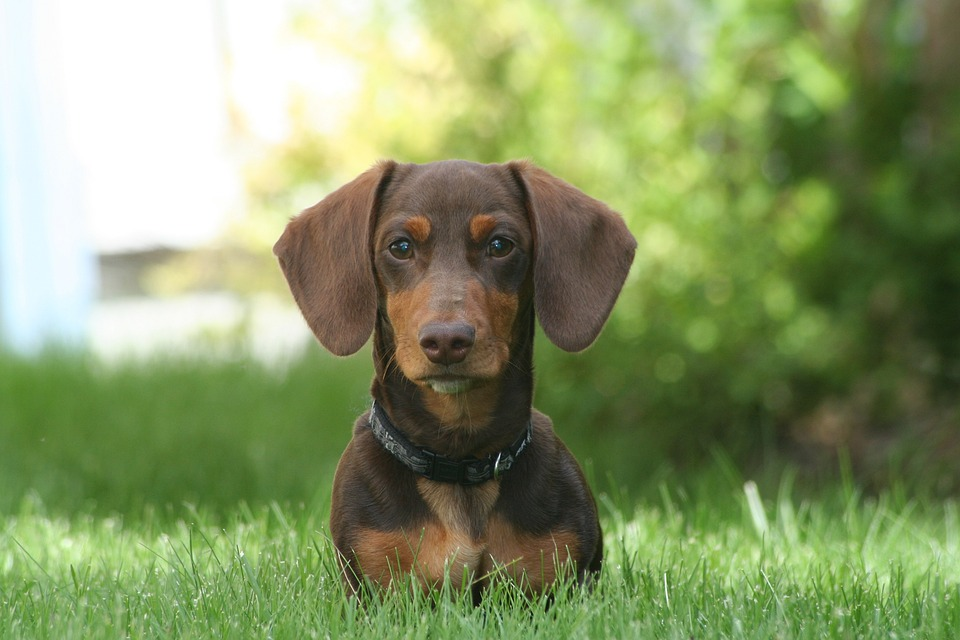Miniature dachshunds are an adorable and popular breed of dog that have captured the hearts of many. These small and spunky pups are known for their long bodies, short legs, and charismatic personalities. As they grow and develop, miniature dachshunds can exhibit a range of behaviors that may seem cute and endearing, but can also be challenging to manage. One common question that miniature dachshund owners have is when do these dogs calm down?
In this blog post, we will explore the topic of when miniature dachshunds calm down in depth. We will look at the different factors that can influence their energy levels and behavior, including age, exercise, training, socialization, and health. We will also provide tips and strategies for managing and calming down miniature dachshunds, so that you can enjoy a happy and harmonious relationship with your furry friend.
Whether you are a current or prospective miniature dachshund owner, this blog post is for you. So, grab a cup of coffee and let’s dive into the world of miniature dachshunds!
Key Takeaways:
- Miniature dachshunds can take up to two years to fully calm down and reach maturity.
- Factors such as breed, size, exercise, training, and environment can affect when miniature dachshunds calm down.
- Owners can manage their miniature dachshund’s energy through exercise, mental stimulation, training, and creating a calm environment.
Understanding miniature dachshunds
Miniature dachshunds, also known as “wiener dogs”, are a breed of small-sized hounds that were originally bred in Germany to hunt badgers. They have a distinctive appearance, with a long body, short legs, and a friendly, curious expression. Miniature dachshunds come in a variety of colors and coat types, including smooth, wire-haired, and long-haired.
One of the most unique things about miniature dachshunds is their temperament. They are known for being spunky, bold, and full of energy, which can make them a handful for some owners. However, they are also incredibly loyal and affectionate, and they love nothing more than spending time with their human companions.
When it comes to behavior, miniature dachshunds are known for a few key traits. They can be quite vocal, and they may bark or howl to express their feelings. They are also known for being quite stubborn, which can make them a challenge to train at times. However, with patience and persistence, they can learn to follow commands and behave appropriately.
In addition to their behavior, there are also a few health issues that miniature dachshund owners should be aware of. Due to their long bodies, miniature dachshunds are prone to back problems, such as intervertebral disc disease (IVDD). This can cause pain and mobility issues, and may require surgery or other treatments. Other health issues that miniature dachshunds may face include dental problems, obesity, and eye issues.
Overall, understanding the unique characteristics of miniature dachshunds is key to being a successful owner. By knowing their behavior, temperament, and health needs, you can provide them with the care and attention they require to thrive.
Factors affecting when miniature dachshunds calm down
Miniature dachshunds are known for their high energy levels and playful personalities, but just like any other breed, they eventually calm down as they age. The age at which a miniature dachshund will start to calm down can vary based on several factors, including:
- Genetics: The temperament and behavior of a miniature dachshund can be influenced by their genes. If their parents were particularly active or high-strung, they may take longer to calm down than other dogs.
- Exercise: Regular exercise is important for all dogs, but it’s particularly crucial for high-energy breeds like miniature dachshunds. Providing your dog with plenty of opportunities to run, play, and explore can help them burn off excess energy and reduce anxiety.
- Training: A well-trained miniature dachshund is more likely to be calm and well-behaved than a dog that has not received proper training. Teaching your dog basic commands, such as sit, stay, and come, can help them learn to behave appropriately in different situations.
- Environment: The environment in which a miniature dachshund lives can also affect their energy levels. If they are exposed to loud noises, lots of people, or other stressful situations, they may be more prone to anxiety and hyperactivity.
- Health: Certain health conditions can also affect a miniature dachshund’s behavior and energy levels. For example, if they are experiencing pain or discomfort due to a back problem or other health issue, they may be more restless and active than usual.
Overall, there is no set age at which miniature dachshunds will calm down, as it can vary based on a number of factors. However, by providing your dog with regular exercise, training, and a calm, stable environment, you can help them develop into a well-behaved and happy companion.
Related: Clingy Behaviour in Mini Dachshunds?
When do miniature dachshunds calm down?
Now that we have discussed the factors that can influence when miniature dachshunds calm down, let’s look at some general timelines for when you can expect your pup to start to mellow out.
- Age: As we mentioned earlier, miniature dachshunds reach maturity at around 1 to 1.5 years old. After this point, you can expect your pup to start to calm down and become less hyperactive.
- Training: Consistent training can help your miniature dachshund learn to relax and be less anxious. Teaching them basic obedience commands, such as “sit” and “stay,” can help them feel more secure in their environment and reduce their need to constantly be on the go.
- Exercise: Regular exercise is important for all dogs, but it can be particularly beneficial for hyperactive breeds like miniature dachshunds. Aim for at least 30 minutes of exercise each day, whether it’s a brisk walk or a game of fetch in the backyard.
- Socialization: Miniature dachshunds can be prone to anxiety and nervousness, especially around strangers. Proper socialization from a young age can help your pup feel more comfortable around new people and in new situations, which can in turn reduce their hyperactivity and excitability.
- Health: Finally, it’s important to ensure that your miniature dachshund is in good health. Certain health issues, such as thyroid problems, can cause hyperactivity and restlessness in dogs. Regular visits to the vet and proper nutrition can help ensure that your pup stays healthy and happy.
Overall, it’s important to remember that every dog is different, and there’s no one-size-fits-all answer to when miniature dachshunds will calm down. However, with proper training, exercise, socialization, and care, you can help your pup grow into a happy, healthy, and well-behaved companion.
Managing the energy of miniature dachshunds
As mentioned earlier, miniature dachshunds are an active and energetic breed, which means they require plenty of exercise and mental stimulation. Here are some tips for managing their energy levels:
- Exercise regularly: Taking your miniature dachshund for a walk or run can help burn off some of their excess energy. Aim for at least 30 minutes of exercise per day, but be mindful not to over-exercise them, as they are prone to back problems.
- Play games: Miniature dachshunds love to play, so incorporating games into their routine can be an effective way to manage their energy. Simple games like fetch or hide-and-seek can provide both physical and mental stimulation.
- Provide mental stimulation: Miniature dachshunds are intelligent dogs that need mental stimulation to prevent boredom. Consider providing puzzle toys or training sessions to keep their minds engaged.
- Create a routine: Establishing a routine can help manage your dog’s energy levels by providing structure and predictability. This can include set times for exercise, feeding, and playtime.
- Be consistent: Consistency is key when it comes to managing your dog’s energy levels. Stick to a routine and avoid sudden changes that could disrupt their routine and cause stress or anxiety.
- Consider daycare or a pet sitter: If you are unable to provide enough exercise or mental stimulation for your miniature dachshund, consider using a dog daycare or hiring a pet sitter to provide additional care and attention.
By following these tips, you can help manage the energy of your miniature dachshund and provide them with a happy and healthy life. Remember, every dog is unique, so it may take some trial and error to find the best approach for managing their energy levels.
Tips for calming down miniature dachshunds
Managing the energy level of your miniature dachshund can be challenging, but there are some tips and tricks that can help you keep them calm and happy.
- Regular exercise: Exercise is an excellent way to burn off your dachshund’s excess energy. A daily walk or play session can help them stay calm and relaxed throughout the day.
- Mental stimulation: Mental stimulation is just as important as physical exercise for dogs. Activities such as training sessions, puzzle toys, and interactive games can help to keep their minds busy and their energy level low.
- Calming supplements: Some calming supplements such as CBD oil, chamomile, or lavender can help to reduce anxiety and stress in your dachshund.
- Consistency: A consistent routine can help your dachshund feel secure and calm. Try to stick to a regular feeding, exercise, and bedtime schedule.
- Crate training: Many dachshunds find comfort in their crate. Providing them with a cozy space of their own can help them to feel calm and relaxed.
- Calm environment: Create a calm environment for your dachshund to relax in. Provide them with a comfortable bed, soothing music, and a quiet space away from distractions.
- Positive reinforcement: Praise and rewards are powerful tools for encouraging good behavior in dogs. Positive reinforcement can help to reinforce calm behavior and reduce anxiety in your dachshund.
Conclusion
In conclusion, miniature dachshunds are high-energy dogs that can take some time to calm down. It’s essential to understand the factors that influence their energy levels, such as age, exercise, and temperament. Providing adequate physical and mental stimulation, consistent training, and a healthy diet can also help manage their energy levels.
Additionally, knowing how to calm down a miniature dachshund is crucial for a harmonious and happy relationship between you and your furry friend. The tips we’ve discussed, such as creating a calming environment, using toys, and practicing relaxation techniques, can be effective in calming down your miniature dachshund.
As with any dog, it’s important to be patient and consistent in your approach to managing their energy and calming them down. With the right care, attention, and training, miniature dachshunds can make wonderful, loyal companions for many years to come.

